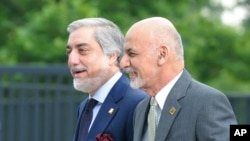Afghanistan’s new electoral commissioners were sworn in Tuesday, paving the way for long-delayed parliamentary and district council elections.
President Ashraf Ghani and his governing partner in the so-called National Unity Government (NUG), Chief Executive Abdullah Abdullah, witnessed and addressed the swearing-in ceremony at Kabul’s presidential palace.
The appointments to Afghanistan’s Independent Election Commission (IEC) and Independent Election Complaints Commission (IECC) come after more than two years of political wrangling between the two leaders.
A U.S.-brokered political deal between Ghani and Abdullah led to the formation of NUG in September 2014, ending months of political chaos stemming from the fraud-marred presidential elections that could not produce a clear mandate for the Afghan election rivals.
Leadership positions
The agreement allowed Ghani to take charge as president, while Abdullah was given the newly created office of chief executive.
The political deal required the two leaders to reform the electoral system as soon as possible to ensure future parliamentary and regional elections in the war-hit country were free of controversy.
President Ghani also removed IEC and IECC members responsible for organizing the controversial 2014 presidential polls. Abdullah blamed the two panels for favoring Ghani in the electoral process.
Until now, persistent differences between Ghani and Abdullah over new appointments to the electoral commissions had blocked any progress toward much-needed electoral reforms. The stalemate forced the Afghan president to extend indefinitely the terms of national parliament and regional assemblies.
On Tuesday, both leaders asserted the new commissioners were chosen after a long and transparent process of mutual consultations, saying it has now taken their political deal forward.
To convene
The newly elected national and provincial parliaments will be required to convene a mandatory joint session known as the Constitutional Jirga (assembly) for amending the constitution to decide whether to give legal cover to Abdullah’s office and make him prime minister.
The U.N. Assistance Mission in Afghanistan (UNAMA) welcomed Tuesday’s appointments to the electoral commissions, saying they signal a new phase in the rebuilding of trust in the electoral institutions and process.
“UNAMA encourages the commissions to work with all stakeholders in an inclusive, transparent and impartial manner,” the mission’s office in Kabul said in a statement.
“The commissions have an important responsibility to establish a realistic electoral timeline in order to uphold the Afghan people’s constitutional right to participate in elections,” it added and promised more technical support to the electoral process.
Ghani and Abdullah have been under fire for taking a long time to introduce electoral reforms to end the country's political uncertainty.
Political opponents have long blamed differences between the two Afghan leaders for recent battlefield advances by Taliban insurgents and for the rise in deadly militant violence across Afghanistan.




